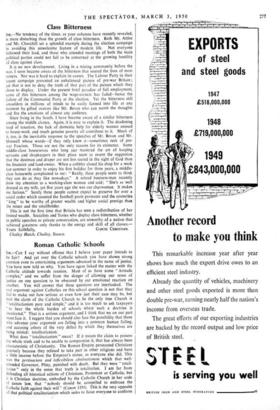Class Bitterness
SIR,—No tendency of the times, as your columns have recently revealed, is more disturbing than the growth of class bitterness. Both Mr. Attlee and Mr. Churchill set a splendid example during the election campaign in avoiding this unwelcome feature of modern life. Not everyone followed their lead, and those who attended meetings of both the main political parties could not fail to be concerned at the growing hostility of class against class.
It is no new development. Living in a mining community before the war, I soon became aware of the bitterness that soured the lives of most miners. Nor was it hard to explain its causes. The Labour Party in their recent campaign presented an unbalanced picture of pre-war Britain ; yet that is not to deny the truth of that part of the picture which they chose to display. Under the present brief paradise of full employment, some of this bitterness among the wage-earners has faded—hence the failure of the Communist Party at the election. Yet the bitterness still smoulders in millions of minds to be easily fanned into life at any moment by gifted orators like Mr. Bevan who can numb the thoughts and fire the emotions of almost any audience.
Since living in the South, I have become aware of a similar bitterness among the middle classes. Again, it is easy to explain it. The deadening load of taxation, the lack of domestic help for elderly women unused to house-work and much genuine poverty all contribute to it. Much of it, too, is the inevitable response to the speeches of Mr. Bevan and Mr. Shinwell .whose words—if they only knew it—sometimes reek of pre- war Fascism. Those are not the only reasons for its existence. Some middle-class housewives who long ago mastered the art of keeping servants and shopkeepers in their place seem to resent the suggestion that the dustman and draper are not less sacred in the sight of God than the financier and land-owner. When a cobbler closed his shop for a week last summer in order to enjoy his first holiday for three years, a middle- class housewife complained to me: "Really, these people seem to think they can do as they like nowadays." A retired business-man recently drew my attention to a working-class woman and said: "She's as well dressed as my wife, yet five years ago she was our charwoman. It makes me furious." Surely these people cannot expect to preserve for ever a social order which counted the football pools promoter and the cosmetics "king" to be worthy of greater wealth and higher social prestige than the miner and the smallholder.
This is not the first time that Britain has seen a redistribution of her limited wealth. Socialists and Tories who display class bitterness, whether in public speeches or private conversation, are unworthy of a nation that achieved greatness only thanks to the energy and skill of all classes.—


































 Previous page
Previous page